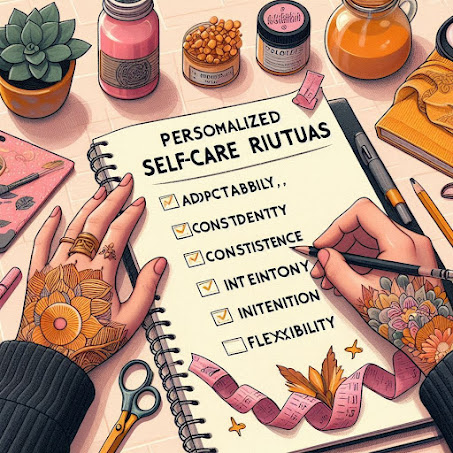Self-care Rituals
Rituals of self-care are deliberate, mindful practices that individuals engage in to nurture their physical, emotional, and mental well-being. These rituals go beyond routine tasks; they are intentional acts that create a sense of calm, balance, and connection with oneself.
1. The Importance of Rituals in Self-Care
Mindfulness and Presence
Rituals of self-care are distinguished from
ordinary habits by the presence of mindfulness. Engaging in a self-care ritual
requires being fully present in the moment, paying attention to the sensations,
emotions, and thoughts that arise. This mindfulness transforms mundane
activities into meaningful experiences that contribute to overall well-being.
Consistency and Routine
Self-care rituals provide structure and
consistency in a busy world. By establishing regular rituals, individuals
create a reliable framework for self-care that can help reduce stress, enhance
mood, and improve mental clarity. These rituals become anchors in the day,
providing stability and predictability.
Emotional Nourishment
Rituals of self-care are designed to nourish
the soul as much as the body. Whether it’s taking time to meditate, journaling,
or enjoying a cup of tea, these practices offer emotional sustenance, helping
individuals reconnect with themselves and manage the demands of daily life.
2. Types of Self-Care Rituals
Skincare Rituals
Skincare is a popular form of self-care, where
individuals engage in cleansing, exfoliating, moisturizing, and treating their
skin with intention. The tactile experience of applying products, coupled with
the focus on caring for one’s appearance, creates a calming, nurturing routine
that enhances both physical and emotional well-being.
Mindfulness and Meditation
Mindfulness practices, such as meditation, deep
breathing, or yoga, are powerful rituals that help cultivate inner peace and
awareness. These rituals promote mental clarity, reduce stress, and foster a
deep sense of connection with oneself.
Creative Expression
Engaging in creative activities like drawing,
painting, writing, or playing music can be a form of self-care. These rituals
allow individuals to express their emotions and thoughts, providing an outlet
for creativity and self-discovery.
Physical Wellness
Exercise, stretching, and movement can be
ritualized as self-care practices that support physical health and emotional
well-being. Whether it’s a morning walk, a yoga session, or a workout, these
activities are ways to honor the body and release tension.
Pampering and Relaxation
Pampering rituals, such as taking a bath, using
aromatherapy, or enjoying a massage, provide a luxurious form of self-care.
These rituals create a sense of indulgence and relaxation, helping to soothe
the mind and body.
Nutritional Self-Care
Preparing and enjoying nourishing meals can be
a ritualistic practice of self-care. Taking time to select ingredients, cook
mindfully, and savor the flavors can transform eating into a ritual that honors
the body and its needs.
3. The Psychological and Emotional Benefits
Stress Reduction
Engaging in self-care rituals helps reduce
stress by providing moments of relaxation and mindfulness. These rituals act as
a buffer against the pressures of daily life, offering a sanctuary where
individuals can recharge and restore their energy.
Boosting Self-Esteem
Regular self-care rituals reinforce the idea
that one is deserving of care and attention. This boosts self-esteem and
self-worth, fostering a positive self-image and a sense of empowerment.
Emotional Regulation
Self-care rituals offer a healthy way to
process and manage emotions. By creating time and space to focus on one’s
emotional state, individuals can better understand and regulate their feelings,
leading to greater emotional resilience.
Enhanced Mind-Body Connection
Rituals of self-care strengthen the mind-body
connection by encouraging individuals to listen to their body’s needs and
respond with care. This awareness leads to a more balanced and harmonious
relationship with oneself.
4. Creating Personalized Self-Care Rituals
Intention and Purpose
To create meaningful self-care rituals, it’s
essential to start with intention. Consider what areas of your life need
nurturing and what practices resonate with your needs. Whether it’s relaxation,
creativity, or mindfulness, choose rituals that align with your goals and
values.
Consistency Over Complexity
Effective self-care rituals don’t need to be
elaborate or time-consuming. What matters is consistency. A simple daily
practice, like a morning skincare routine or evening meditation, can have
profound effects when done regularly.
Adaptability and Flexibility
Life is dynamic, and self-care rituals should
be adaptable. Allow your rituals to evolve with your changing needs and
circumstances. This flexibility ensures that self-care remains relevant and
supportive throughout different stages of life.
Rituals of self-care are powerful tools for
nurturing the mind, body, and spirit. They go beyond routine actions, offering
intentional, mindful practices that contribute to overall well-being. By
integrating self-care rituals into daily life, individuals create sacred
moments of connection, healing, and empowerment, leading to a deeper sense of
self-awareness, balance, and fulfillment.






Comments
Post a Comment